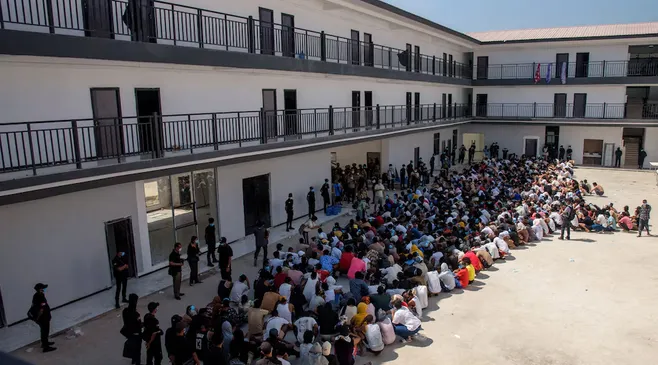Toronews.blog
Andi (not his real name) still recalls the moment the overseas job offer arrived—it was a chance he didn’t want to miss. The promise of a better life for his family and the dream of working abroad seemed within reach. He quickly accepted the offer, which came through a friend.
"They offered me a job in Thailand as a customer service agent," Andi told Narasi.
"I didn’t have to pay anything—they covered the tickets."
Two days later, Andi flew to Thailand from Jakarta’s Soekarno-Hatta Airport, holding a ticket provided by a contact arranged online by his friend. Upon landing at Suvarnabhumi Airport, he was picked up and taken to stay in Bangkok.
“I forgot the name of the hotel, but it was in Bangkok,” he said.
At first, he suspected nothing. But the next day, he was flown again—this time from Bangkok to Mae Sot, a border area between Thailand and Myanmar. There, a Chinese national picked him up and transferred him into another car in a hotel parking lot.
Andi remembered the hotel was named “02” in a district in Mae Sot, located at 200 Mae Pa, Mae Sot District, Tak 63110, Thailand. From there, he was switched into another vehicle and taken to a location near the Thai-Myanmar border, where he waited for nearly half an hour.
Hotel 02, Mae Sot, Thailand @google
He suspects the place was controlled by corrupt Thai immigration officers, as he was asked to hand over his identification. Soon after, Andi was taken across the Moei River. It was at that moment he began to feel uneasy—he had been taken far from Bangkok, where the job was supposedly based.
When he reached Myanmar, he was greeted by armed soldiers at the border and transported in a military-style vehicle alongside Chinese nationals he had met earlier in Mae Sot.
“That’s when I really started feeling suspicious,” he said.
“The job was supposed to be in Bangkok, but I was taken all the way to the border.”
Abdul, a resident of Bekasi, West Java, still remembers when he received a job offer in Thailand during the COVID-19 pandemic in 2022. He and about eleven others were gathered at a local restaurant in Bekasi by a husband-and-wife pair before flying out.
Having no reason to be suspicious, Abdul departed for Thailand with the rest of the group. They flew from Soekarno-Hatta Airport in the early morning and entered Thailand through Don Mueang Airport. Upon arrival, they were met by a Singaporean national who welcomed them and took them out for a meal in Bangkok.
There, they were briefed about working for a digital company. The next day, they were transported by minibus to Mae Sot, a Thai district bordering Myanmar. At first, Abdul suspected nothing. But once they crossed the Moei River and were met by soldiers with long-barrelled weapons.
“We were met by armed soldiers and taken away in a vehicle,” Abdul said.
He was brought to a location he would later learn was a cyber scam center. There, he met Robiin—a former member of the Indramayu Regional Legislative Council (DPRD) in West Java—who had also fallen victim to trafficking and forced labor in the same Myanmar border scam operation.
We spoke with Robiin shortly after he was released and had returned to Indonesia. He recounted how he was lured by a job posting on Facebook. At the time, Robiin was working in Singapore. The ad promised high-paying work in Thailand, and he decided to pursue it.
He bought his own plane ticket to Thailand and followed the scammer’s instructions via phone. They led him all the way to the Thai-Myanmar border, where he crossed the Moei River. It wasn’t until he arrived in Myanmar and was picked up by armed guards that he realized he had been deceived.
“I was in Singapore at the time, and the promise of a lucrative salary drew me in,” Robiin said. “I flew to Thailand, thinking I was starting a legitimate job.”
Chapter II: Forced to Scam and Days of Violence
Andi still recalls his first moments inside the scam compound. He was brought before a Malaysian national who served as the recruitment manager. Andi pleaded to be sent home, but his request was in vain.
“I’m a victim too,” the Malaysian recruiter told him. “Just do the job and survive. If you try to escape, it could cost you your life.”
Andi described the compound as heavily guarded and nearly impossible to escape. Armed soldiers watched the main gate, while the perimeter was secured with barbed wire and CCTV. The scam site resembled a walled business complex, complete with surveillance posts and soldiers stationed every few meters.
Within the compound, everything was provided—from supermarkets and hotels to entertainment centers. There was only one entrance, and the area was surrounded by four-story buildings. Some were used to house trafficked victims, others functioned as operational offices for the scam syndicate.
Andi would later learn that the site was known as KK Park, a name that appeared frequently in news reports on scam hubs in Southeast Asia. He only discovered the location’s identity after escaping and sharing his location with family members in Indonesia.
“I managed to send my location to my family,” Andi said.
